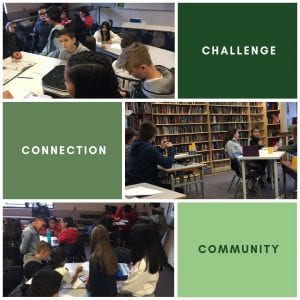Having gone through and read all of the genius hour blogs (the third ones, the ones where you chose what to write about), I’m realizing that students are struggling with how to write an interesting, informative Genius Hour post. Blogging is a different kind of communication, so the types of writing that we normally do may not always work. However, every type of writing should be interesting and engaging for your audience.
So let’s take a look at some of the common blogfails:
The This Then Blog Post
Today our teacher put us into groups according to what we were planning on doing for genius hour. My group and I all talked about our plans, but decided we were doing things that are different. When we were done, I went on my phone and looked at different websites about how to ask good questions. Then I watched a video. I think that next time I might try writing out some different questions.
The problem with this type of blog post is that there’s no real information there. When I read it, I have a vague idea of what the writer is planning on doing, a very long list of what she did during the period, and absolutely no interest in every reading another of her posts.
The Vague but Positive Blog Post
I was working with a group that Ms Smith created for us today. It was really fascinating to learn what people were doing! I enjoyed hearing Nikki talk about saving the whales. She was so passionate, and it made me think that she might be successful. She’s going to create a website with interviews with whales on it. Darren’s genius hour plan is equally incredible. He’s really passionate about stopping the deforestation happening in the Amazonian rainforest, so he’s going to raise money to send to the Amazonian Rainforest Preservation Society by selling wooden pencils. I talked a little bit about my plans too, but I was really amazed by how wonderful everyone else’s ideas were.
This person is really enthusiastic, and has at least provided some information in her blog post, but she’s completely failed to mention much about what she’s doing. We know more about Nikki and Darren’s plans than we know about hers.
The Hands In the Air Blog Post
I didn’t really get what we were supposed to be doing today. My teacher put us in groups, but everyone in my group was doing something different, so while it was interesting to hear, it didn’t really help me figure out what I’m going to do. I’d like to look at how to get more books in school, but I’m not really sure how I can do that. This is just too big of a problem. Maybe I should choose something else.
We know what this person wants to do, but we have absolutely no confidence in his ability to do it. For whatever reason, he didn’t decide to talk to his teacher about not knowing what to do when he was in class, and now he’s posting about it so the entire world can see, as if we are expected to come up with his ideas for him.
Most of the blogs that struggled in our last round of posting fell into one or more of these categories. What you need to remember is that we are writing for an audience, that we need to engage that audience, and that we’re not required to have all of the answers right now. We’re not even required to have all of the questions.
What we are required to do is write about our learning, our thoughts, our struggles, our interests, our questions, our answers, our process, our plans – all of these things and more – in a way that provides our readers with information that is interesting and prompts conversation.
I did an example blog post in my fake-blog as an example. It’s not perfect (it’s not meant to be), but it does provide an example of what I’m looking for in blog posts. Read it, and comment on that post about what you notice. What makes it different from the examples above?

